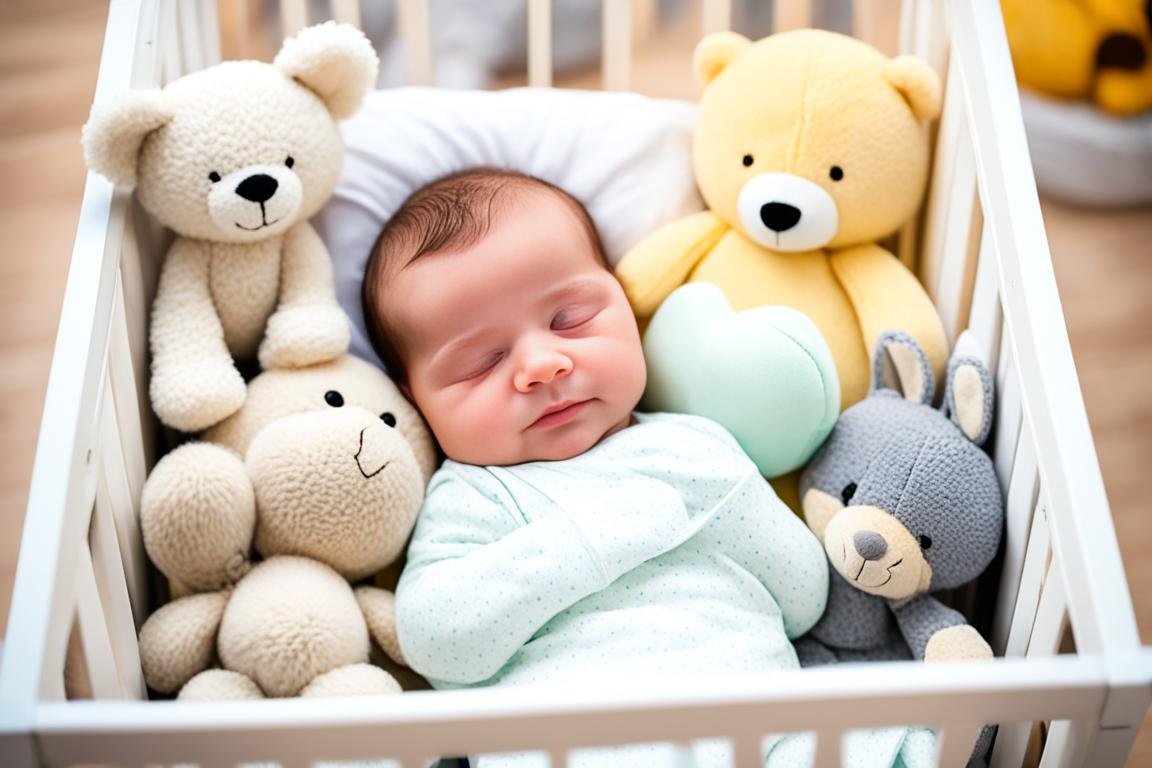As a new parent, you might have heard your newborn make many sounds while sleeping. They could be grunts, whimpers, and even snorts. These newborn sleep sounds are pretty common. They are a normal part of your baby’s growth.
New research shows that newborn babies sleep in very short cycles. They move in and out of sleep all night. This means you’ll hear lots of infant night noises. Your baby’s lungs, digestion, and sleep habits are still getting better. Babies also spend a lot of their sleep time moving in a light sleep called REM. This can make them make newborn sleep grunts, baby sleep snorts, and little newborn sleep whimpers.
Newborns sleep in cycles that last about 45-50 minutes. Nearly half of this time is the active, noisy sleep stage. These sounds, like infant sleep murmurs and baby sleep snores, are usually fine. They shouldn’t worry you, unless your baby is really upset.
Key Takeaways:
- Newborns make various noises while sleeping because they are still growing.
- Many of a baby’s sleep hours are spent in a light, moving stage, causing more sounds.
- Newborns have quick sleep cycles, with much time in this active, noisy sleep.
- Most newborn sleep sounds are okay and do not mean trouble, unless your baby looks very upset.
- If you’re concerned about your baby’s sleep sounds or rhythm, you should talk to your doctor.
Understanding Newborn Sleep Patterns
Newborn babies sleep very differently from older kids and adults. They have two main sleep stages: active and quiet. These stages are key to knowing why your newborn makes noises and moves so much during sleep.
Active Sleep Stage
In active sleep, babies are basically in REM sleep. But, their muscles aren’t still like in adults, so they wiggle and make sounds. Even with their eyes open, babies are still asleep. Active sleep in newborns makes up a big part of their sleep time, making them seem restless.
Quiet Sleep Stage
On the other hand, quiet sleep is when newborns sleep deeply. Babies’ breathing and movements calm down. They don’t move or make sounds as much in this stage. Quiet sleep is very important for your baby’s healthy growth.
Rapid Eye Movement (REM) Sleep
Babies have a lot of REM sleep, about half of their total sleep time. This is more than older kids and adults. REM sleep in newborns is regular but short, making sound and movement part of a newborn’s sleep.
Common Newborn Sleep Sounds
While your baby sleeps, you might hear several newborn sleep sounds. These sounds show your baby is growing. They go from regular breaths to sounds from their tummy.
Regular Breathing Sounds
Your baby might make short or soft breaths. They could even pause for a bit during newborn REM sleep. This kind of breathing is okay and nothing to be worried about.
Irregular Breathing Sounds
There might be times when your baby breathes fast or slow. This happens as their body learns to breathe better. Over time, you’ll hear less of these changes.
Digestive Sounds
Things like tummy noises, burps, and gas are also normal. These newborn sleep sounds are part of digestion. They are a sign your baby’s stomach is doing its job.
Respiratory Sounds
Some sounds like whistling or wheezing can happen because a newborn’s airways are tiny. If your baby seems okay and not upset, these sounds are usually fine.
Feeding Sounds
At times, you might hear sounds like lip-smacking. This shows your baby might be hungry or trying to feed better.
Vocalizations
Sounds like cries, whimpers, and grunts are very normal. These newborn sleep sounds are part of how your baby learns and grows.
These sounds could be loud but they’re normally not a problem. They will also get quieter as your baby grows during the first months.
Reasons for Noisy Newborn Sleep
Newborns are often known for being loud sleepers. This happens because their bodies are still growing. Their breathing and eating systems are getting ready. This makes their noises like irregular breathing or tummy sounds common.
Nose Breathing
Newborns often breathe mostly through their tiny noses. This leads to noises when their noses get stuffy. You might hear sounds like whistling or rattling. It’s usually from a little mucus or milk moving into their noses.
Short Sleep Cycles
Little babies have very short sleep cycles. They go from active to quiet sleep about every 45-50 minutes. This change can make them make more sounds. It’s because they keep moving from one sleep type to another. They spend a lot of time in a very active, REM sleep stage.
To deal with your noisy sleeper, it helps to know why they’re loud. You could try using a sound machine. It might drown out some of the sound. Or, moving the crib away a bit might help.
newborn making noises while sleeping
It’s normal for newborn babies to make sounds like grunts, whimpers, and snorts when they sleep. These newborn making noises while sleeping are just part of their active sleep.
Baby sleep sounds happen because a newborn’s breath and stomach are developing. They also have a lot of REM sleep. This usually gets better by the time the baby is 3-6 months old.
It might seem like your baby is loud when they sleep, but don’t worry. It’s all part of their normal sleep. If your baby seems fine and is not upset, these newborn making noises while sleeping are okay.
When to Seek Medical Attention
Most newborn sleep sounds are just fine. But some noises might need a doctor’s check. Watch if your baby breathes fast, over 60 times a minute for a while. Call their doctor if you hear rhythmic grunting with every breath. This can mean they’re having trouble breathing.
Rapid Breathing
If your newborn breathes fast and hard, it’s worrisome. It might be due to issues like pneumonia or asthma. If your baby keeps breathing fast, get help right away.
Grunting with Every Breath
A baby grunting with each breath might not be breathing well. This grunting sound when they breathe could signal an airway blockage. It’s important to see the doctor if you notice this.
Signs of Distress
Look for other trouble signs like flared nostrils or skin turning blue. Seeing these signs means you should contact the doctor fast. It might indicate a serious breathing problem.
Even though most baby sounds are nothing to worry about, be cautious. It’s okay to check with a doctor if you’re unsure. They can help you understand your baby’s breathing better.
Tips for Getting Better Sleep
As a new parent, your baby’s constant noises at night may keep you awake. Luckily, there are ways to help both you and your little one sleep better.
White Noise Machine
A white noise machine is great for blocking out baby sounds. It makes soft, consistent noise that covers the baby’s sleep sounds. This lets you sleep better but still hear your baby if they need you.
Room Sharing Guidelines
The American Academy of Pediatrics says you should share a room with your baby for the first 6 months to lower SIDS risk. Being close can make it hard to ignore baby noises. Using a white noise machine can cut down on these sounds, helping you sleep.
Transitioning to Nursery
When your baby is 6 months old, it’s time to think about moving them to their own nursery. This helps both you and baby get better sleep. Start with short times in the nursery and keep the bedtime routine. This makes the change easier for your baby.
Outgrowing Noisy Sleep
As your baby grows, you may hear less sound from their sleep, typically between 3 to 6 months. This is because babies move away from active sleep to deeper, quieter stages. A second source notes that this change is linked to better breathing and digestion as babies grow.
By 5 years old, your child’s sleep will be much like that of an adult’s, with less moving and noise. Although some little ones still make noise when asleep, most sleeping sounds quiet down by 3 to 6 months old. This shows how bodies change and adapt as we get older.
Common Parental Concerns
New parents watch every move and sound their baby makes while sleeping. They worry about mistaking active sleep for wakefulness. And they are concerned about the safety of swaddling during this time.
Mistaking Active Sleep for Wakefulness
It’s common for new parents to think their baby is awake when they’re in active sleep. Sometimes, they try to calm or feed the baby when it’s not necessary. This happens because babies spend most of their sleep time moving and making noise.
This stage is a lot like our REM sleep, but newborns can still move. They do this about 40-50% of their sleep time.
Swaddling During Active Sleep
Swaddling a baby during this active sleep may not be the best idea. It could make the baby wake up more. Or the baby might not get the benefits of this special sleep time. The muscles of the baby are not still during this time like in adult REM sleep. So, they can move and make sounds freely. Swaddling stops this and can mess up their sleep.
The third source points out a key step: spend 30-60 seconds watching your baby’s sleep before doing something. This helps you figure out if they really need you or if they’re just in an active sleep phase. If you know why they’re making noise, you can help them sleep better without interrupting too much.
Conclusion
Newborns often make a lot of sounds when they sleep. They might grunt, whimper, or snort. This is because their breathing and digestion are still growing. Also, they sleep a lot in a very active way.
Most of these sounds are okay. But, parents should be careful. They should look for signs like fast, hard breathing or strange skin color. If something seems wrong, they should call their doctor.
Parents can get better at knowing which sounds are normal. Knowing this can help them take good care of their baby. It also helps the baby sleep well in these early growth times.




